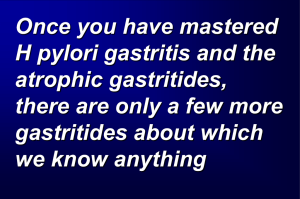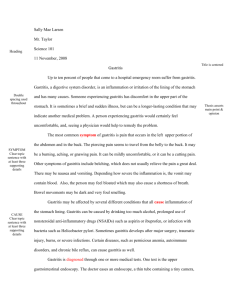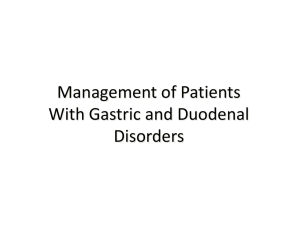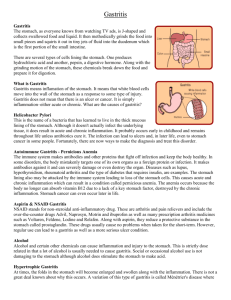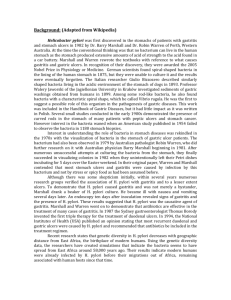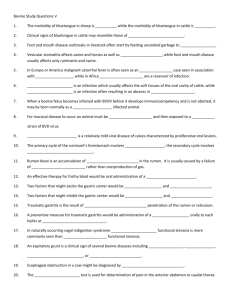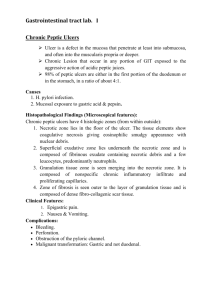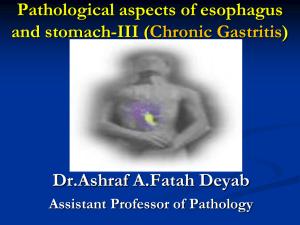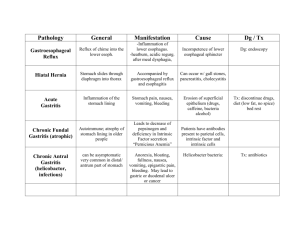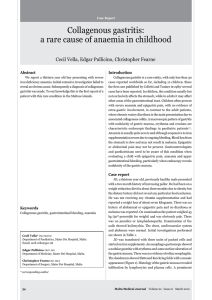G_1868_Gastritis_and_Diet
advertisement
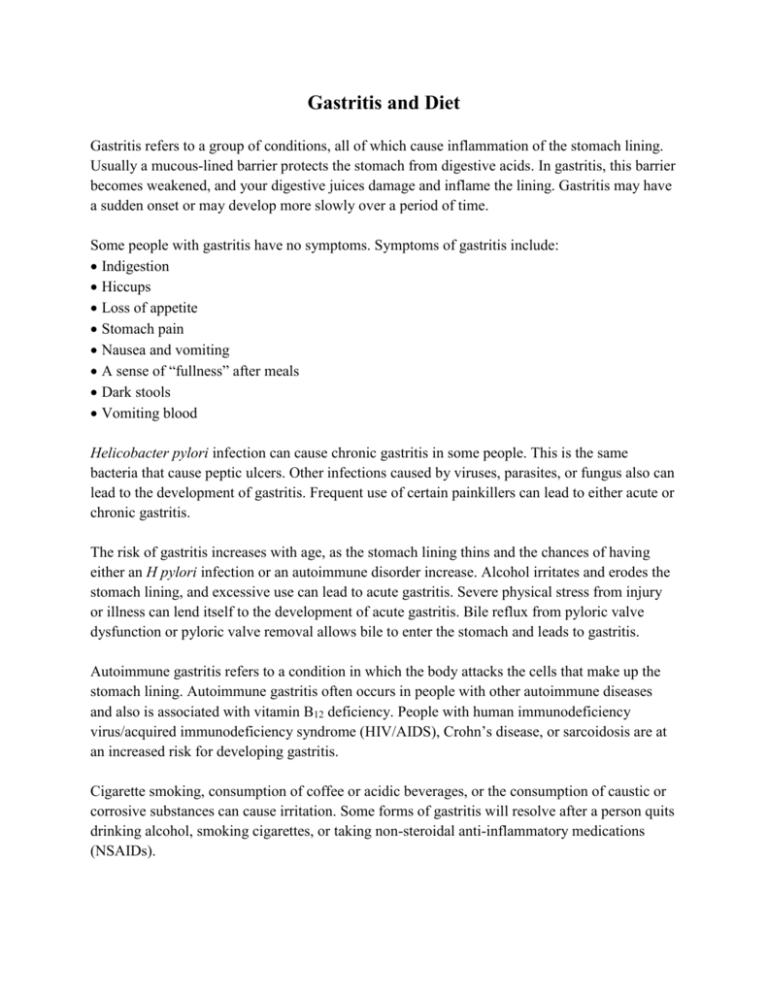
Gastritis and Diet Gastritis refers to a group of conditions, all of which cause inflammation of the stomach lining. Usually a mucous-lined barrier protects the stomach from digestive acids. In gastritis, this barrier becomes weakened, and your digestive juices damage and inflame the lining. Gastritis may have a sudden onset or may develop more slowly over a period of time. Some people with gastritis have no symptoms. Symptoms of gastritis include: Indigestion Hiccups Loss of appetite Stomach pain Nausea and vomiting A sense of “fullness” after meals Dark stools Vomiting blood Helicobacter pylori infection can cause chronic gastritis in some people. This is the same bacteria that cause peptic ulcers. Other infections caused by viruses, parasites, or fungus also can lead to the development of gastritis. Frequent use of certain painkillers can lead to either acute or chronic gastritis. The risk of gastritis increases with age, as the stomach lining thins and the chances of having either an H pylori infection or an autoimmune disorder increase. Alcohol irritates and erodes the stomach lining, and excessive use can lead to acute gastritis. Severe physical stress from injury or illness can lend itself to the development of acute gastritis. Bile reflux from pyloric valve dysfunction or pyloric valve removal allows bile to enter the stomach and leads to gastritis. Autoimmune gastritis refers to a condition in which the body attacks the cells that make up the stomach lining. Autoimmune gastritis often occurs in people with other autoimmune diseases and also is associated with vitamin B12 deficiency. People with human immunodeficiency virus/acquired immunodeficiency syndrome (HIV/AIDS), Crohn’s disease, or sarcoidosis are at an increased risk for developing gastritis. Cigarette smoking, consumption of coffee or acidic beverages, or the consumption of caustic or corrosive substances can cause irritation. Some forms of gastritis will resolve after a person quits drinking alcohol, smoking cigarettes, or taking non-steroidal anti-inflammatory medications (NSAIDs). At one time, a bland diet was recommended for people with gastritis, but this is no longer the case. Avoid acidic beverages, including coffee (both caffeinated and decaffeinated), carbonated beverages, and fruit juice with citric acid. Avoid caffeine, which is found in coffee, some soft drinks, chocolate, and tea. Eating a diet that is high in fiber and flavonoids and low in fat and sodium might help. Flavonoids, believed to stop the growth of H pylori, are found in apples, celery, cranberries, onions, garlic, and tea. Some health professionals recommend multivitamins, omega-3 fatty acid supplements, and probiotics for people with digestive health conditions. Cranberry, capsaicin, and peppermint supplements are some of the most commonly recommended alternative therapies for gastritis, but always talk to your doctor before beginning to take any supplements or herbal preparations. If left untreated, gastritis can lead to peptic ulcers in the stomach or first part of the intestine and bleeding. Some forms of chronic gastritis increase the risk of stomach cancer. References and recommended readings Chamberlain NR. Infections of the esophagus, stomach, and duodenum. Available at: http://www.atsu.edu/faculty/chamberlain/Website/lectures/lecture/GI3.htm. Accessed March 6, 2013. Mayo Clinic. Gastritis. Available at: http://www.mayoclinic.com/health/gastritis/DS00488. Accessed March 6, 2013. Palo Alto Medical Foundation, Sutter Health®. Gastritis. Available at: http://www.pamf.org/health/healthinfo/index.cfm?A=C&hwid=hn-1217004. Accessed March 6, 2013. University of Maryland Medical Center. Gastritis. Available at: http://www.umm.edu/altmed/articles/gastritis-000067.htm. Accessed March 6, 2013. Contributed by Elaine M. Koontz, RD, LD/N Review Date 3/13 G-1868

